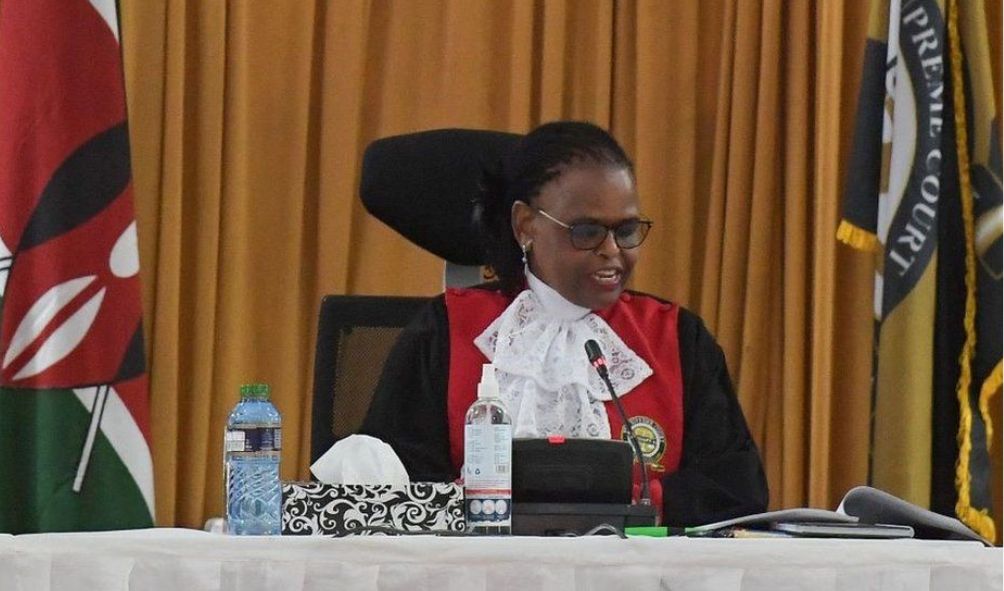Judiciary issues new guidelines on sentencing of sick and elderly offenders

Head of the Judiciary CJ Martha Koome publishes new guidelines to be applied by judges when jailing the elderly and sick
Head of the Judiciary CJ Martha Koome publishes new guidelines to be applied by judges when jailing the elderly and sick.
Chief Justice Martha Koome has published new guidelines that Judges and Magistrates will use while sentencing terminally ill, elderly, chronically sick, and offenders with mental illness.
Koome said in the guidelines, which were released on Friday, September 1, that judges considering instances of offenders with disabilities should take into account whether the sentence imposed is excessive in light of the offender’s illness or advanced age.
She encouraged the judges to take into account two factors, whether the offender would suffer unjustified hardship in custody due to illness or old age and if the conditions in custody would be deemed inhumane given the offender’s condition.
“Secondly, whether the offender’s condition is one that would cause undue burden on other offenders and/or prison officers taking care of them,” Koome advised.
Chief Justice Koome reminded Judicial officers that Article 57 of the Constitution affirms the right of older members of society to live in dignity.
“The sentence imposed on them must therefore not undermine this right,” the guidelines read in parts.
According to Koome, other State ministries had made substantial headway in dealing with similar situations, and the judiciary needed to reassess the sentences given to indigent defendants.
Other offenders with terminal illnesses such as those in need of chemotherapy for cancer treatment; hypertension; diabetes or other chronic illnesses, are not adequately catered for and face undue hardship while in custody.
“When imposing sentencing orders against terminally ill and elderly offenders, a court should ensure that the sentence imposed does not amount to an excessive punishment in view of the extent of illness and age, as well as in light of the offence committed,” the guidelines read in parts.
In particular, Koome advised that the court should ensure that the sentence imposed does not amount to cruel, inhuman, or degrading treatment in view of the extent of illness or age of the offender.
“The guidelines stated that non-custodial or suspended sentences should be considered unless, in light of the nature and seriousness of the offence committed and other factors, justice would demand the imposition of a custodial sentence,” Koome advised.
The Chief Justice also noted that some accused persons may come before the courts while suffering from mental illness that varies in degree.
“For the purposes of the Guidelines, there are three general categories, and they include mental illness that may amount to a legal defence under section 166 of the Criminal Procedure Code, and with the application of the M’Naughten Rules.
“The second category is where mental illness that does not amount to a legal defence may nevertheless require consideration in determining the ability of an accused person to understand the proceedings against him.” Koome stated.
The last category is where mental illness doesn’t fall into the above two categories and may nevertheless impact the kind of sentence that the court should impose in determining a just and proportionate response to the crime committed.
The Judiciary noted that it is important for the presiding Judge to make these distinctions when rendering sentences to mentally sick persons.
“For offenders suffering from a mental illness that amounts to defence, section 166 of the Criminal Procedure Code makes provision for where the court makes a finding of ‘guilty but insane’.
Passport processing to take 24 hours, Kindiki says on Nyayo House clean-up
Ruto signs anti-money laundering law for tracking mobile money transactions
Security scare as plane crashes into a school building
Kremlin to take Wagner mercenaries to Africa after killing of Prighozin
DPP appeals against Babu Owino’s acquittal case in DJ Evolve shooting
“Here, the law provides that the court must order the offender into custody whilst awaiting the President’s order. The court has the discretion as to the place and manner of custody during this period,” Koome advised.
She observed that Under section 166 (3) of the Criminal Procedure Code, the President may then order that the person be detained in a mental hospital, prison or other suitable place of safe custody.
In such circumstances, the order committing an offender with mental illness to safe custody is accompanied by a regular review mechanism.
The review is undertaken through the lens of the officer in charge of the institution keeping the offender in safe custody, with the first review coming three years after the initial committal and subsequently after every two years.
“Where improvement is noted in the follow-up evaluation of the offender, the same should be brought to the attention of the President for further appropriate orders including discharge where applicable.
“For accused persons who cannot understand the proceedings against them as a result of a mental illness, Section 167 of the Criminal Procedure Code makes provision for cases where the accused person cannot understand the proceedings against him,” the advisory read in parts.
Also read,
Pakistan PM forced to cancel trip to Kenya
Gabon opposition accuses Bongo of orchestrating the coup after his cousin is named the new leader
France ready to ‘respond’ after Niger military orders police to throw French envoy out
Karua hits out at Ruto over corruption in Judiciary remarks ‘start with yourself’
Follow us





